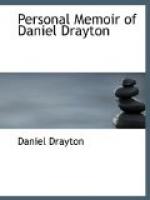“District Attorney.—I shall endeavor to be very brief in the opening, reserving myself till I know the grounds of defence. It is the duty of the jury to give their verdict according to the law and evidence; and, so far as I knew public opinion, there neither exists now, nor has existed at any other time, the slightest desire on the part of a single individual that the prisoner should have otherwise than a fair trial. I think, therefore, the solemn warnings by the prisoner’s counsel to the jury were wholly uncalled for. There was, no doubt, an excitement out of doors,—a natural excitement,—at such an amount of property snatched up at one fell swoop; but was that to justify the suggestion to a jury of twelve honest men that they were not to act the part of a mob? The learned counsel who opened the case for the prisoner has alluded to the disadvantage of his position from the fact that he was a stranger. I acknowledge that disadvantage, and I have attempted to remedy it, and so has the court, by extending towards him every possible courtesy.
“The prisoner’s counsel seems to think I press this matter too hard. But am I to sit coolly by and see the hard-earned property of the inhabitants of this District carried off, and when the felon is brought into court not do my best to secure his conviction? [The District Attorney here went into a long and labored defence of the course he had taken in preferring against the prisoner forty-one indictments for larceny, and seventy-four others, on the same state of facts, for transportation. He denied that the forty-one larcenies of the property of different individuals could be included in one indictment, and declared that if the prisoner’s counsel would show the slightest authority for it he would give up the case. After going on in this strain for an hour or more, attacking the opposite counsel and defending himself, in what Carlisle pronounced ’the most extraordinary opening argument he had ever heard in his life,’ the District Attorney came down at last to the facts of the case.”]
“In what position is the prisoner placed by the evidence? How is he introduced to the jury by his Philadelphia friends? These witnesses were examined as to his character, and the substance of their testimony is, that he is a man who would steal a negro if he got a chance. He passed for honest otherwise. But he says himself he would steal a negro to liberate him, and the court says it makes no difference whether he steals to liberate or steals to sell. Being caught in the act, he acknowledges his guilt, and says he was a deserter from his God,—a backslider,—a church-member one year—the next, in the Potomac with a schooner, stealing seventy-four negroes! Why say he took them for gain, if he did not steal them? Why say he knew he should end his days in a penitentiary? Why say if he got off with the negroes he should have realized an independent fortune? Did he not know they




